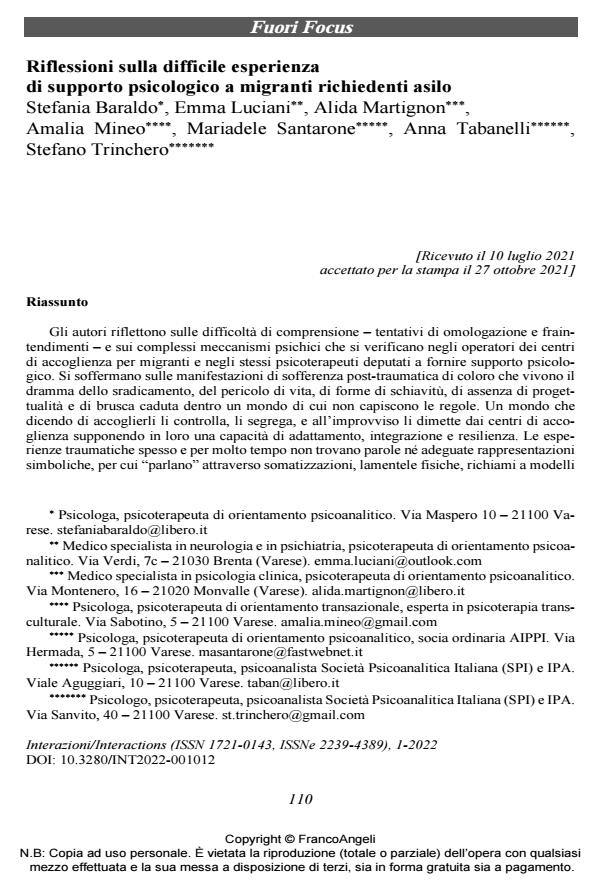Considerations about the difficult experience of giving psychological support to migrant asylums seekers
Journal title INTERAZIONI
Author/s Stefania Baraldo, Emma Luciani, Alida Martignon, Amalia Mineo, Mariadele Santarone, Anna Tabanelli, Stefano Trinchero
Publishing Year 2022 Issue 2022/1
Language Italian Pages 17 P. 110-126 File size 191 KB
DOI 10.3280/INT2022-001012
DOI is like a bar code for intellectual property: to have more infomation
click here
Below, you can see the article first page
If you want to buy this article in PDF format, you can do it, following the instructions to buy download credits

FrancoAngeli is member of Publishers International Linking Association, Inc (PILA), a not-for-profit association which run the CrossRef service enabling links to and from online scholarly content.
The authors reflect on the difficulty in the understanding - resulting inattempts at homolo-gation and misinterpretations - and on the complex psychic mechanisms that occur among the staff of the receptioncentres for migrants and even among the psychotherapists appointed to providethe migrants with psychological support.They consider the manifestations of the post-traumatic suffering of those who endure the dramatic experiences of uprooting, life-threatening events, different forms of slavery, impossibility or incapacity to plan for the future, and of an abrupt, harshdescent into a world with rules migrants don’t understand. A world that, despite its pretence of welcoming them, controls them, segregates them, and then suddenly releases them from the reception centresin the assumption that they have the skills and resilience to adapt and integrate. Often, and over a lengthy period of time, traumatic experiences don’t find words nor adequate symbolic representations, and henceforth they "speak" through somatiza-tions, physical complaints, references to examples and models belonging to the culture of origin, all of which results in bewilderment and helplessness among those who are supposed to listen and comprehend. According to the authors, cultural differencespose not only the problem of the correct in-terpretation of the uneasiness and symptoms mentioned, but also questions on the adequacy of the setting and the interpretative keys utilised in our culture. The article mentions some trans-cultural approaches and the psychotherapists’ need for a shared space for comparison on counter-transferal life experiences, often overwhelming, which, if not understood and processed, may lead to attitudes of renunciation and avoidance.
Keywords: migration trauma, cultural misinterpretations, transcultural settings.
- Abbal T. (2006). Dinamiche familiari e insuccesso scolastico dei figli delle famiglie migranti. In Dal Verme S., Facchetti B. (a cura di), Quaderni di formazione alla clinica transculturale. Milano: Crinali cooperativa sociale onlus.
- De Micco V. (1999). Psicoanalisi e cultura: le tracce di un impensato (introduzione all’edizione italiana, curata da Virginia De Micco). In Assoun P.L. (1993), Freud e le Scienze sociali. Psicoanalisi e teoria della cultura. Roma: Borla.
- De Micco V. (2016). La pelle che abito, il nome che porto: fratture culturali e legami transgenerazionali nei bambini migranti. Rivista di Psicoanalisi, 62, 1: 231-240.
- De Micco V. (2017). Migrare: sopravvivere al disumano. Rivista di Psicoanalisi, 63, 3: 663-672.
- Devereux G. (1972). Etnopsicoanalisi complementarista. Milano: FrancoAngeli, 2013.
- Idris I. (2017). Accogliere chi viene da lontano. In Atti del convegno Cooperativa Crinali. Milano: Crinali cooperativa sociale onlus.
- Montagner P. (2019). Un luogo per vivere? Rivista Psiche, 6, 1: 249-266. DOI: 10.7388/93697
- Moro M.R., De La Noe Q., Mouchenik Y. (2009). Manuale di psichiatria transculturale. Dalla clinica alla società. Milano: FrancoAngeli.
- Nathan T. (1996). Principi di etnopsicoanalisi. Torino: Bollati Boringhieri.
- Tabanelli A., et al. (2009). Radici e trasformazioni. In Francesconi M., Scotto di Fasano D. (a cura di), Apprendere dal bambino. Riflessioni a partire dall’Infant Observation. Roma: Borla.
- Tabanelli A., Scotto di Fasano D. (2014). Nascere lontano: geografie della maternità. Interazioni, 39, 1: 90-102. DOI: 10.3280/INT2014-001008
Stefania Baraldo, Emma Luciani, Alida Martignon, Amalia Mineo, Mariadele Santarone, Anna Tabanelli, Stefano Trinchero, Riflessioni sulla difficile esperienza di supporto psicologico a migranti richiedenti asilo in "INTERAZIONI" 1/2022, pp 110-126, DOI: 10.3280/INT2022-001012